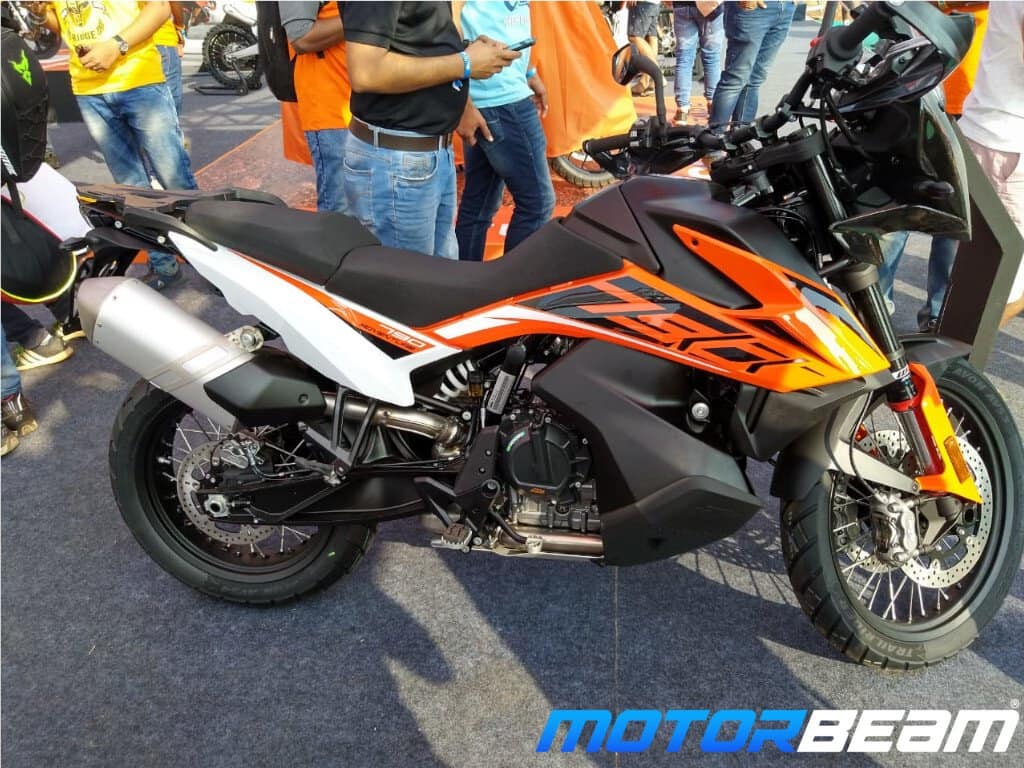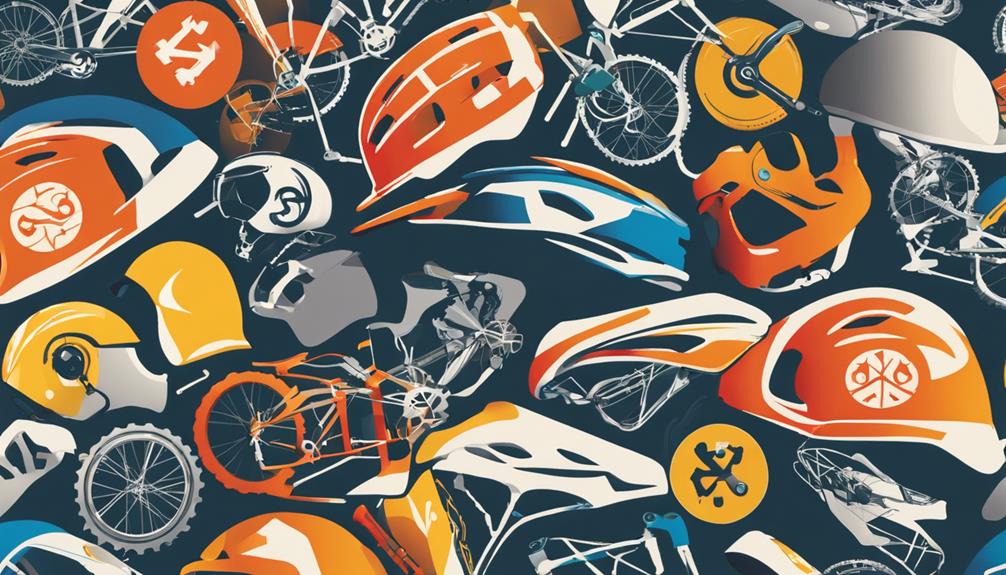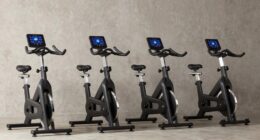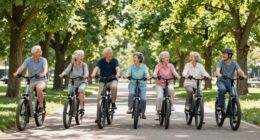For peak cycling performance, eat a high-carb meal 3-4 hours before your ride, like pasta or rice. An energy snack 30-60 minutes prior, such as a banana, is great. During the ride, aim for 30-60 grams of carbohydrates per hour, using energy gels or bars. Afterward, refuel within 20-60 minutes with carbs and protein to aid recovery. Don’t forget to hydrate regularly—dehydration can hit your performance hard. There’s much more to explore to enhance your cycling nutrition!
Key Takeaways
- Consume a high-carb meal 3-4 hours before the ride, such as pasta or oatmeal, to optimize glycogen stores.
- Snack on quick-digesting carbohydrates, like bananas or energy bars, 30-60 minutes prior to the ride.
- During the ride, aim for 30-60 grams of carbohydrates per hour, using energy gels or chews for sustained energy.
- Refuel within 20-60 minutes post-ride with a mix of carbohydrates and protein for effective recovery and muscle repair.
- Stay hydrated by drinking 1 liter of water for every 2 pounds lost, adjusting for ride intensity and length.
Importance of Proper Nutrition for Cycling

When you’re hitting the road on your bike, proper nutrition is key to maximizing your performance. Carbohydrates are your primary fuel source, especially during high-intensity efforts.
To maintain ideal energy levels, elite cyclists may need 8-11 grams of carbohydrates per kilogram of body weight daily, while recreational riders should aim for 5-8 grams. Eating a carbohydrate-rich meal 3-4 hours before your ride boosts glycogen stores, while a snack 30-60 minutes prior keeps your energy up.
Elite cyclists require 8-11 grams of carbs per kg daily; recreational riders need 5-8 grams for optimal performance.
Don’t forget hydration; drink one liter of water for every two pounds you lose during cycling to support effective carbohydrate digestion. Additionally, consider including healthy fats in your meals to enhance nutrient absorption and overall energy levels.
Finally, prioritize post-ride nutrition with a carbohydrate-rich meal or shake within 20-60 minutes to replenish glycogen and aid muscle recovery.
What to Eat Before a Ride
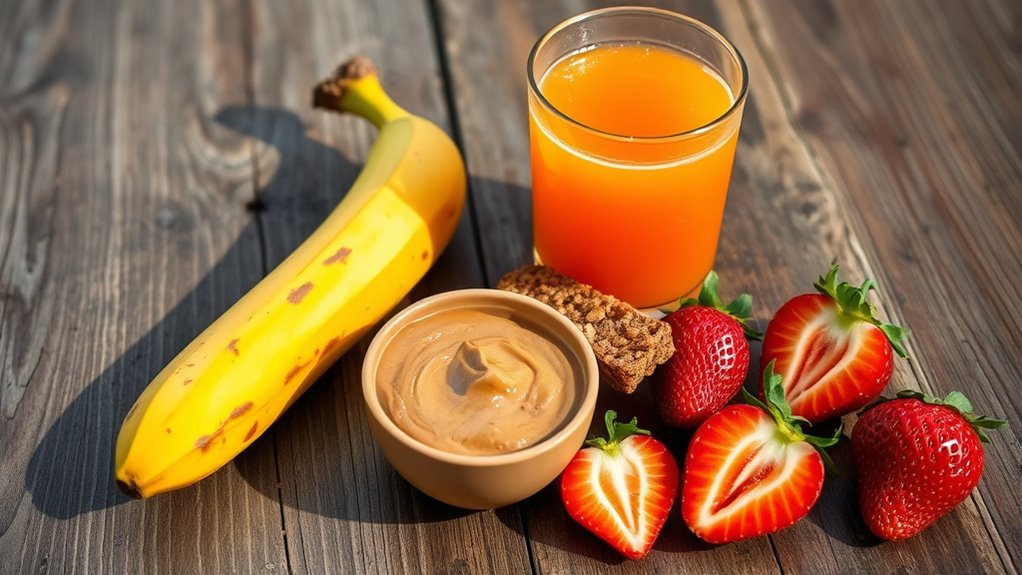
To fuel your ride effectively, choosing the right foods before hitting the road is essential. A high-carb meal 3-4 hours before your ride helps maximize glycogen stores. If you’re short on time, opt for a pre-ride snack 30-60 minutes prior. Aim for 5-8 grams of carbohydrates per kg of body weight, avoiding high-fiber, fatty, or spicy foods that might upset your stomach. Here’s a quick reference:
| Timing | Food Type | Examples |
|---|---|---|
| 3-4 hours | High-Carb Meal | Pasta, rice, oatmeal |
| 30-60 minutes | Pre-Ride Snack | Bananas, energy bars, muffins |
| Hydration | Fluids | Water, electrolyte drinks |
Remember to hydrate adequately to support performance and digestion! Additionally, maintaining proper hydration levels is crucial for optimizing your overall performance during the ride.
Fueling Strategies During the Ride
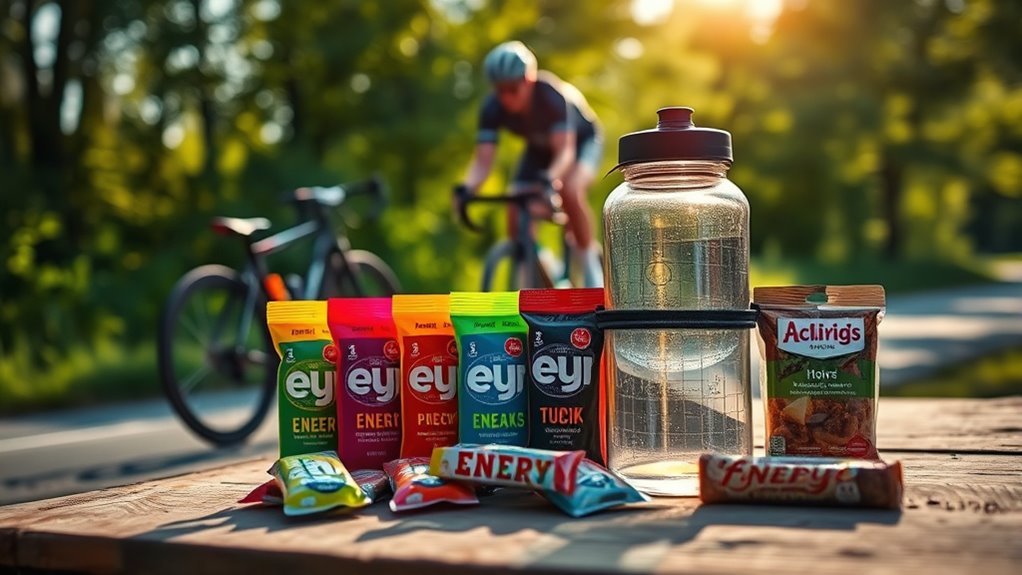
During your ride, keeping your energy levels high is essential, especially for longer sessions.
Aim for 30-60 grams of carbohydrates per hour and remember to stay hydrated separately to enhance your performance.
Mixing up your fuel options can help you stay energized and comfortable throughout your ride. Additionally, incorporating proper hydration strategies can significantly improve your endurance and overall ride quality.
Carbohydrate Intake Recommendations
As you commence your ride, fueling your body with the right amount of carbohydrates is essential for maintaining energy levels.
Your nutrition strategy should adapt based on ride duration:
- For rides lasting 1-1.5 hours, aim for 20-30 grams of carbohydrates (80-120 calories) per hour.
- Increase to 30-60 grams (120-240 calories) for rides of 1.5-3 hours.
- For rides exceeding 3 hours, target 60-90 grams (180-360 calories) per hour.
- Refuel consistently, even if you’re not hungry, to prevent fatigue.
- Pair your carbohydrate intake with hydration for maximum digestion.
Incorporating a budget plan for your nutrition expenses can also help you manage costs while fueling effectively.
Hydration Strategies
While you’re powering through your ride, staying properly hydrated is just as essential as your carbohydrate intake. For rides lasting over an hour, aim for 30-60 grams of carbohydrates per hour to maintain energy levels.
Your hydration strategies should combine water and electrolyte-rich drinks, especially during longer sessions, to replace lost fluids and minerals. If your ride is less than 90 minutes, plain water usually suffices. However, for longer rides, adding carbohydrate beverages can boost performance.
It’s vital to separate energy intake from hydration to avoid gastrointestinal discomfort. Experiment with various fueling options like energy gels, chews, and bars to find what suits your digestive comfort and energy needs best. Additionally, consider incorporating sustainable practices into your cycling nutrition to minimize environmental impact.
Stay hydrated, and you’ll keep your performance peak!
Timing for Refueling
To keep your energy levels consistent throughout longer rides, refueling at the right times is essential. For rides over an hour, aim to consume 30-60 grams of carbohydrates each hour.
If you’re riding for 1.5 to 3 hours, adjust your intake to 20-60 grams based on your energy use. For those epic rides exceeding three hours, ramp it up to 60-90 grams per hour.
Don’t forget hydration—aim to drink 1 liter of water for every 2 pounds lost.
Consider these options for quick energy refueling:
- Energy gels
- Sports drinks
- Nutrition bars
- Bananas
- Dried fruit
These will help sustain your energy and keep you pedaling strong. Additionally, automate savings contributions to better manage your budget and ensure funds are available for nutrition and gear.
Post-Ride Nutrition and Recovery
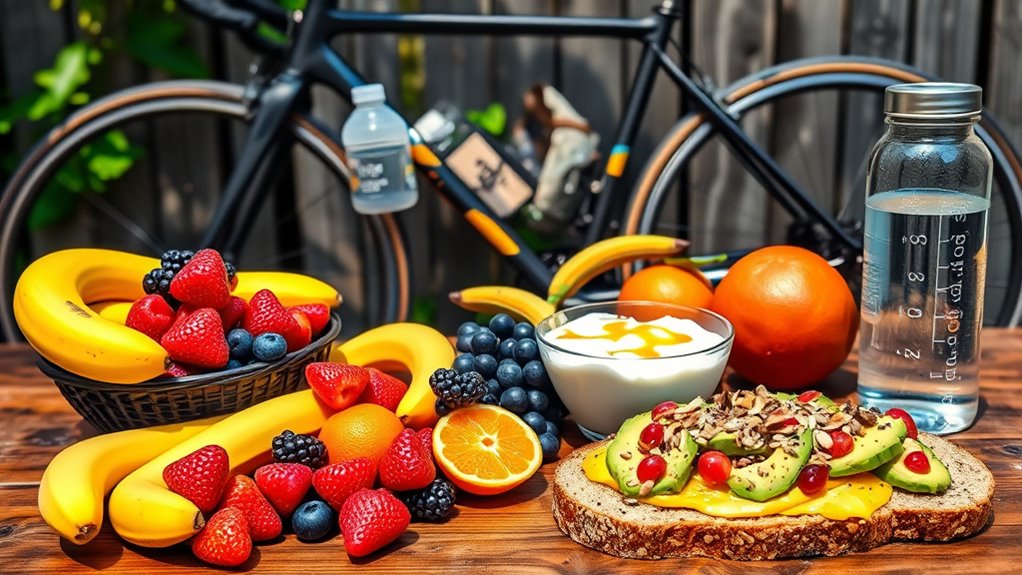
Post-ride nutrition plays an essential role in your recovery, especially when you refuel within 20-60 minutes after cycling. Consuming a carbohydrate-rich meal or recovery drink during this window is critical for optimal glycogen replenishment. This quick action helps your body bounce back effectively.
Aim to include both carbohydrates and protein in your post-ride nutrition, as this combination promotes energy replenishment and muscle recovery. The ideal post-ride meal should also feature healthy fats to support thorough recovery. Additionally, being aware of state tax implications can help you better manage your finances related to your nutrition and recovery needs.
Hydration Considerations for Cyclists
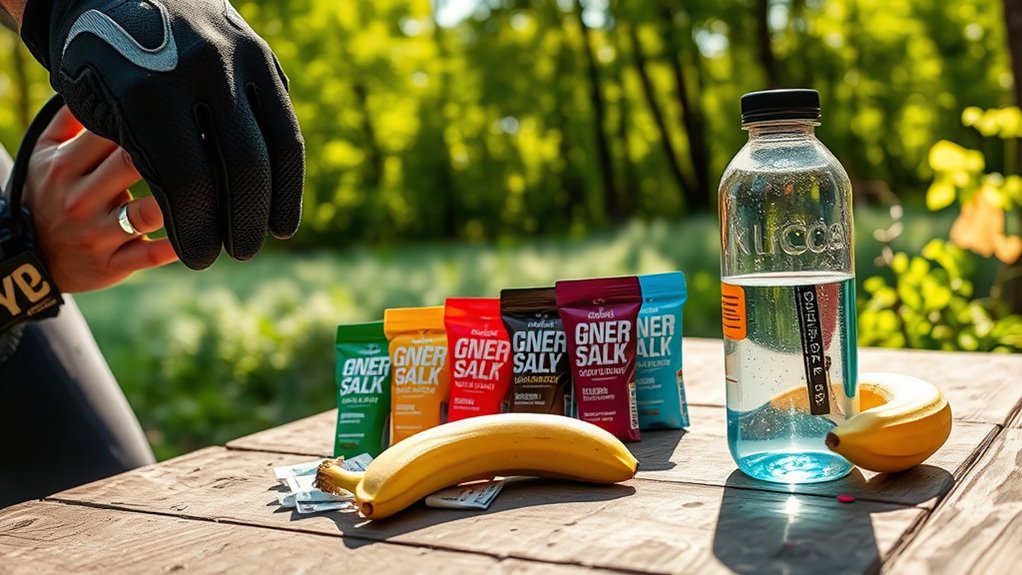
Hydration is essential for maintaining peak performance on the bike, especially during long rides. You should aim for fluid replenishment of about 1 liter for every 2 pounds lost while cycling.
During rides over 90 minutes, don’t rely solely on water; incorporate electrolyte drinks to replace lost minerals. Remember to stay consistently hydrated throughout the day to support your overall performance and recovery.
Individual hydration needs can vary, so pay attention to:
- Temperature and humidity levels
- Ride intensity and duration
- Signs of dehydration, like fatigue or dizziness
- Fluid intake before, during, and after rides
- Personal preferences for electrolyte drinks
Additionally, consider using portable camping toilets for convenience during long cycling trips where bathroom access may be limited. Monitoring these factors will help you optimize your hydration strategy and enhance your cycling experience.
Common Mistakes to Avoid in Cycling Nutrition
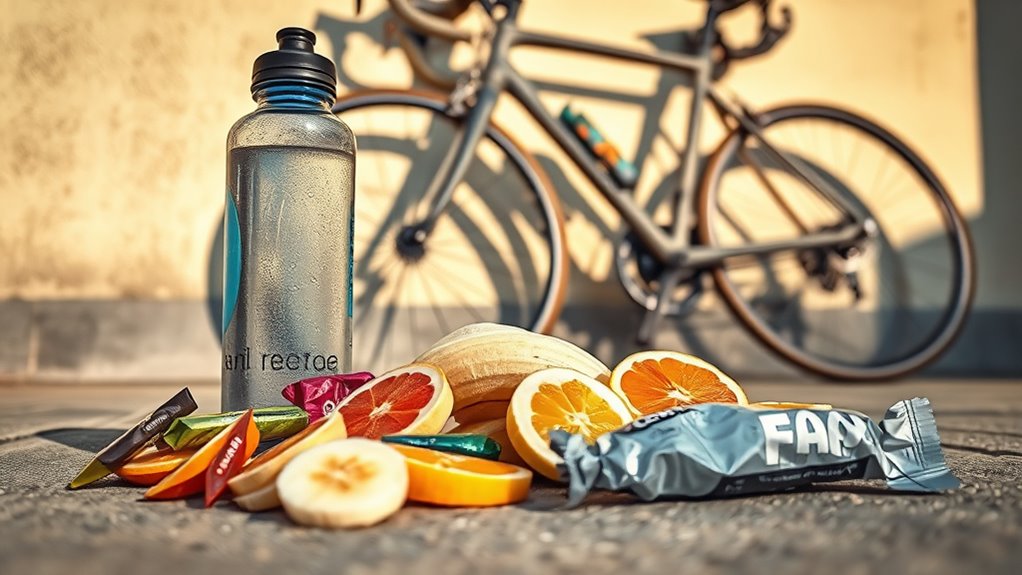
When it comes to cycling nutrition, avoiding common mistakes can make a huge difference in your performance.
You might underestimate your hydration needs, overeat before rides, or skip important post-ride meals. Proper storage of nutrients and hydration products is crucial for maintaining their effectiveness during your rides.
Let’s explore these pitfalls so you can fuel your rides effectively.
Ignoring Hydration Needs
Many cyclists overlook the importance of hydration, which can drastically affect performance. Dehydration can slow gastric emptying, hindering energy absorption during your rides.
To stay on top of your game, remember these key points:
- Drink 1 liter of water for every 2 pounds lost
- Short rides may only need plain water
- Longer rides require electrolyte drinks to replenish lost minerals
- Hydrate consistently throughout the day, not just before your ride
- Waiting until you’re thirsty can lead to inadequate fluid intake
- Regular monitoring of hydration levels can help optimize performance and prevent dehydration.
Overeating Before Rides
Have you ever felt sluggish or uncomfortable during a ride after eating too much beforehand? Overeating before a ride can lead to significant discomfort and hinder your performance. High-fat and high-fiber foods slow digestion, increasing the risk of cramping.
To fuel your ride effectively, aim for a high-carb meal or snack that’s easily digestible—about 30-60 grams of carbs—2-4 hours before hitting the road. Be cautious with high-GI snacks right before a ride; while they provide quick energy, overindulging can lead to an energy crash.
Monitoring individual responses to different meals is essential. Keeping a food diary can help you identify what works best for you and prevent overeating before a ride, ensuring a more enjoyable cycling experience.
Skipping Post-Ride Meals
While it might be tempting to skip a meal after a long ride, doing so can seriously undermine your recovery. Within 20-60 minutes post-ride, you need to refuel your body with a balanced meal that includes carbohydrates and protein. Missing this window can lead to significant performance setbacks and fatigue.
Here’s what you should aim for in your post-ride meals:
- A hearty smoothie packed with fruits and protein powder
- Whole grain toast topped with avocado and eggs
- Greek yogurt with honey and granola
- A recovery drink if food isn’t available
- A colorful salad with lean protein and quinoa
Consistent post-ride nutrition habits are essential for peak recovery and will enhance your performance in future rides.
Frequently Asked Questions
What to Eat Before, During, and After a Bike Ride?
Before your bike ride, eat a carbohydrate-rich meal 3-4 hours earlier, or grab a small snack 30-60 minutes before, aiming for 30-60 grams of carbs.
During rides over an hour, fuel your energy with 30-60 grams of carbs per hour, using gels or sports drinks.
After your ride, refuel within 20-60 minutes with a carb and protein-rich meal or shake to help recover effectively.
Don’t forget to stay hydrated throughout!
What Is the 75 Rule in Cycling?
The 75 Rule in cycling suggests you should aim for about 75 grams of carbohydrates per hour during high-intensity rides lasting longer than 90 minutes.
This guideline helps you maintain energy levels and avoid fatigue. When you stick to this rule, you can prevent hitting the “wall” that comes from depleted glycogen stores.
Just remember, it’s important to tailor your intake based on your personal energy needs and ride intensity.
Is It Better to Eat Bananas Before or After Cycling?
You might wonder if it’s better to eat bananas before or after cycling.
Eating a banana before your ride gives you quick energy, thanks to its easily digestible sugars and high carb content. It fuels you for that intense effort ahead.
After your ride, a banana helps with recovery by replenishing glycogen stores and providing potassium, which can prevent cramps.
Ideally, you can enjoy bananas both times for peak performance and recovery.
Is It Better to Ride a Bike on an Empty Stomach?
Riding on an empty stomach might seem appealing for a quick jaunt, but it can drain your energy faster than you think.
Without fuel, your performance dips, risking fatigue and cramps. You’ll struggle to maintain pace, especially on longer rides.
Instead of rolling out hungry, grab a quick snack to boost your energy. You’ll find your endurance improves, and your ride becomes much more enjoyable.
Fuel up, and let the ride be your reward!
Conclusion
In the world of cycling, your nutrition can make or break your performance. As you gear up for your next ride, remember that the right fuel is just as critical as your bike. Will you choose the perfect pre-ride meal, stay energized in the saddle, and recover effectively afterward? The choices you make now can elevate your ride from ordinary to extraordinary. So, what’s stopping you? Embrace the power of proper nutrition and watch your cycling journey transform.


